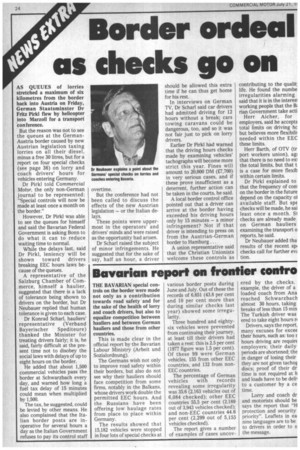Border ordeal as checks go on
Page 26

If you've noticed an error in this article please click here to report it so we can fix it.
AS QUEUES of lorries stretched a maximum of six kilometres from the border back into Austria on Friday, German Staatsminster Dr Fritz Pirkl flew by helicopter into Marzoll for a transport conference.
But the reason was not to see the queues at the GermanAustria border caused by new Austrian legislation taxing lorries on all their diesel, minus a free 30 litres, but for a report on four special checks (see page 36) on lorry and coach drivers' hours for vehicles entering Germany.
Dr Pirkl told Commercial Motor, the only non-German journal to be represented: —Special controls will now be made at least once a month on the border."
However, Dr Pirkl was able to see the queues for himself and said the Bavarian Federal Government is asking Bonn to do what it can to reduce waiting time to normal.
While the delays last, said Dr Pirkl, leniency will be shown toward drivers breaking EEC hours laws because of the queues.
A representative of the Salzburg Chamber of Commerce, himself a haulier, suggested that there is a lack of tolerance being shown to drivers on the border, but Dr Neubauer replied that human tolerance is given to each case.
Dr Konrad Scharl, hauliers' representative (Verband Bayerischer Spediteure) thanked the Minister for treating drivers fairly; it is, he said, fairly difficult at the present time not to disobey the social laws with delays of up to eight hours on the border.
He added that about 1,500 commercial vehicles pass the border at Schwarzbach every day, and warned how long a fuel tax delay of 15 minutes could mean when multiplied by 1,500.
The tax, he suggested, could be levied by other means. He also complained that the Italian border posts are inoperative for several hours a day as the Italian Government refuses to pay its control staff overtime.
But the conference had not been called to discuss the effects of the new Austrian legislation — or the Italian delays.
These points were uppermost in the operators' and drivers' minds and were raised as the opportunity had arisen.
Dr Scharl raised the subject of minor infringements. He suggested that for the sake of say, half an hour, a driver should be allowed_ this extra time if he can thus get home for his rest.
In interviews on German TV, Dr Scharl said car drivers had admitted driving for 12 hours without a break; cars towing caravans could be dangerous, too, and so it was not fair just to pick on lorry drivers.
Earlier Dr Pirkl had warned that the driving hours checks made by examining vehicles' tachographs will become more strict this year. Fines will amount to 20,000 DM (£7,700) in very serious cases, and if these prove insufficient as a deterrent, further action can be taken in the courts, he said.
A local border control office pointed out that a driver can arrive at the border having exceeded his driving hours only by 15 minutes — a minor infringement? Not if that driver is intending to press on from the Austrian-German border to Hamburg . . .
A union representative said that the Christian Unionists welcome these controls as contributing to the qualit: life. He found the numbe irregularities alarming said that it is in the interesi working people that the 11 rian Government take acti Herr Aicher, for employers, said he accepts total limits on driving he but believes more flexibilit needed within the EEC these limits.
Herr Barth, of OTV (tr port workers union), agi that there is no need to exi the total limits, but that t is a case for more flexib within certain limits.
Dr Pirkl explained to that the frequency of coni on the border in the future depend on the capacity oi available staff. But spE checks will be made, he sal least once a month. St checks are already made on German hauliers examining the transport o reports, he said.
Dr Neubauer added tha results of the recent spi checks call for further evi tion.




































































































